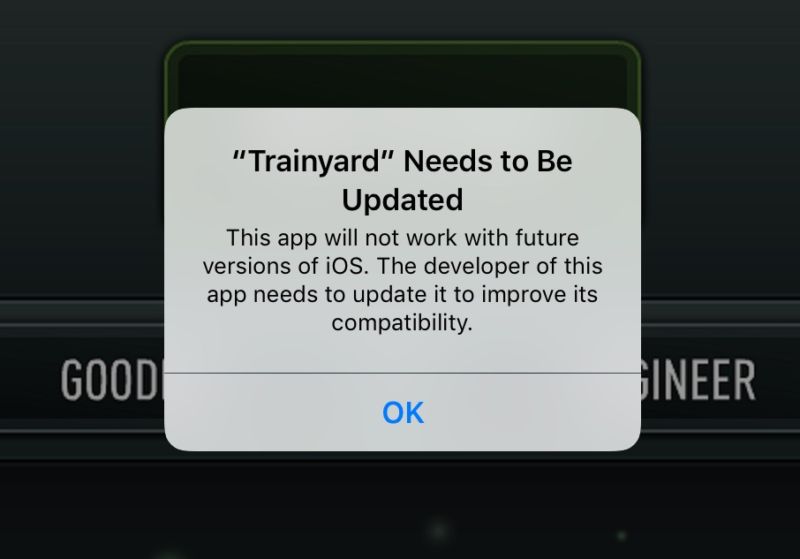
Beta builds of iOS 10.3, the first of which was issued last week, generate warning messages when you try to run older 32-bit apps. The message, originally discovered by PSPDFKit CEO and app developer Peter Steinberger, warns that the apps "will not work with future versions of iOS" and that the app must be updated by its developer in order to continue running. The apps still run in iOS 10.3, but it seems likely that iOS 11 will drop support for them entirely.
Though the error message doesn't explicitly mention the app's 32-bit or 64-bit support, it's definitely only older 32-bit apps that trigger the warning. Similar messages that did explicitly mention 64-bit support were present in the betas of iOS 10.0, but they were removed in the final release of the software. Apple has required 64-bit support for all new app submissions since February of 2015 and all app update submissions since June 2015, so any apps that are still throwing this error haven't been touched by their developer in at least a year and a half (developers could add 64-bit support as early as 2013, but most of them opted not to until it became a requirement).
In part because of Apple's total control of its hardware, operating system, and app distribution platform, iOS' transition from 32-bit software to 64-bit software has been uncommonly smooth and quick. The first 64-bit edition of Windows was released in 2005, and though 64-bit Windows has usually been the default since the Windows 7 era, there's still a 32-bit version of Windows 10, and it still ships on some low-end hardware. Mac OS X (now macOS) began to build 64-bit support into the OS starting in 2003, a process that wasn't completed until 2012; current versions of the OS can still run 32-bit apps that aren't otherwise incompatible. Android's 64-bit transition is complete if you have a newer phone, but some new phones still ship with 32-bit Android, and older phones (even those that actually get software updates and have 64-bit hardware support) will continue to use 32-bit Android.
To provide some perspective, here's iOS' complete 64-bit timeline:
- September 2013: Apple introduces the iPhone 5S. Its Apple A7 chip makes it the first 64-bit iDevice. iOS 7 is the first 64-bit version of iOS, at least when running on the A7.
- October 2013: The iPad Air and what is now called the iPad Mini 2 are introduced. Both include the Apple A7 SoC.
- March 2014: iOS 7.1 is released. It resolves most of the memory-related crashes in 64-bit iOS.
- September 2014: The iPhone 6 and 6 Plus are released. Their Apple A8 chip is Apple's second 64-bit SoC. Apple stops selling the iPhone 4S, making the iPhone 5C the last of the 32-bit iPhones.
- October 2014: The iPad Air 2 and iPad Mini 3 are released. Both include 64-bit chips (the A8X and A7 again, respectively). The fourth-generation Retina iPad, which had been on sale for $399, is discontinued. The original iPad Mini is the last of the 32-bit iPads.
- February 2015: All new apps submitted to the App Store must include 64-bit support.
- June 1, 2015: All app updates submitted to the App Store must include 64-bit support.
- June 19, 2015: Apple quietly discontinues the original iPad Mini. The only 32-bit iPads Apple now sells are refurbished.
- September 9, 2015: Apple announces the iPhone 6S and 6S Plus and stops selling the 32-bit iPhone 5C in favor of the 64-bit iPhone 5S. All new iPhones Apple sells from this point on are 64-bit.
- June 13, 2016: Apple announces iOS 10. Beta versions generate a warning about 32-bit apps, though this is removed in the final release. iOS 10 drops support for the Apple A5, making the Apple A6 and A6X the last supported 32-bit iOS SoCs.
- January 24, 2017: Apple releases the first iOS 10.3 beta, which restores the warning about 32-bit apps.
Removing 32-bit support from iOS would also dovetail with another effort Apple is making to remove old and unmaintained software from the App Store so people can't find it in the first place. Apple is attempting to contact app developers so that anyone who wants to update their apps still can, but they won't be allowed to stay up indefinitely. If iOS 11 drops support for the 32-bit iPhone 5 and 5C and the fourth-generation iPad, removing 32-bit app support could also allow Apple to strip all 32-bit code out of iOS entirely.
As Apple says, purging older apps and keeping them from running is mostly good for users; even if an older app still runs on iOS, it won't support all the newest APIs, and users may experience crashes and other issues that an actively maintained app wouldn't suffer from. The main problem, as is often the case with software and services, is about how to archive these older apps for study or for later use or emulation. When these apps—many of them games—stop working and are removed from the App Store, it will become that much harder to recall the dawn of the modern smartphone era and to research it for other projects.
reader comments
84